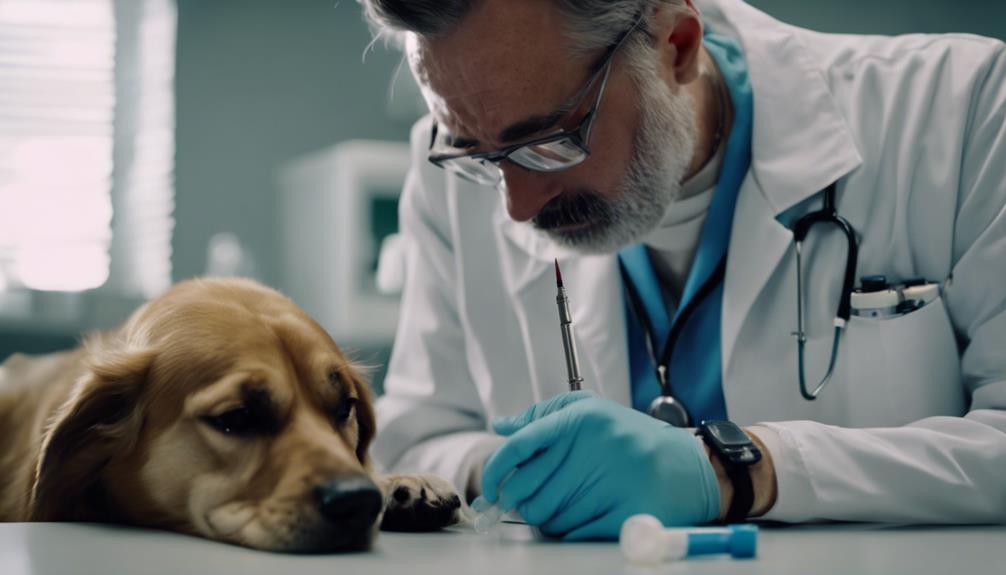Liver failure in dogs is a multifaceted condition that demands a comprehensive understanding to navigate its complexities effectively. From subtle signs that may initially go unnoticed to the critical treatment decisions that can impact outcomes, the landscape of managing liver failure in canines is intricate.
As pet owners, being equipped with knowledge about the signs, treatment modalities, and preventive measures is pivotal in safeguarding our furry companions' health. The journey through the realm of liver failure in dogs unveils a tapestry of challenges and considerations, shedding light on the importance of informed decision-making and proactive veterinary interventions.
Key Takeaways
- Liver failure in dogs is often caused by toxins, genetic factors, and overwhelming the liver's detoxification abilities.
- Symptoms of liver failure include loss of appetite, jaundice, vomiting, and diarrhea in dogs.
- Treatment involves immediate intervention, supportive care, specialized diets, and medications to improve liver function.
- Prognosis for dogs with liver failure is generally poor, focusing on comfort and quality of life with close veterinary support.
Causes of Liver Failure in Dogs
Liver failure in dogs can stem from various causes, including severe toxicity, genetic predisposition, and exposure to harmful substances like xylitol and blue-green algae. Severe toxicity and poisoning can overwhelm the liver's detoxification capabilities, leading to failure.
Additionally, certain breeds such as Labrador retrievers and Dalmatians may have a genetic predisposition to liver issues. Dogs exposed to toxins like xylitol, acetaminophen, or blue-green algae are also at risk. Furthermore, breeds like Bedlington terriers and West Highland white terriers are more susceptible to liver problems.
Understanding these causes is crucial in preventing and managing liver failure in dogs, highlighting the importance of awareness and proactive care.
Signs and Symptoms of Liver Failure
Characterized by a range of clinical manifestations, the signs and symptoms of liver failure in dogs serve as crucial indicators for timely diagnosis and intervention. Common signs of liver failure in dogs include loss of appetite, swollen or enlarged abdomen, vomiting, diarrhea, and jaundice (yellowing of skin, lips, eyes, and gums). These symptoms may vary in severity depending on the stage of liver failure. Early recognition of these signs can prompt a thorough diagnostic workup to determine the underlying cause and initiate appropriate treatment strategies. Timely intervention is essential to improve the prognosis and quality of life for dogs affected by liver failure.
| Signs and Symptoms | Description |
|---|---|
| Loss of appetite | Decreased interest in food and eating habits change |
| Swollen or enlarged abdomen | Abdominal distension or bloating |
| Jaundice | Yellowing of skin, eyes, or gums due to elevated bilirubin levels in blood |
Treatment Options for Liver Failure

Utilizing a comprehensive approach, veterinary professionals employ various treatment modalities to address liver failure in dogs effectively. Treatment plans are tailored to the specific underlying cause and severity of the condition.
In cases of acute liver failure, immediate intervention is crucial and may involve supportive care such as intravenous fluids to maintain hydration and electrolyte balance. Antibiotics are often prescribed to combat secondary infections and reduce the workload on the liver.
Dietary management plays a significant role in supporting liver function, with specialized prescription diets formulated to ease the organ's workload. Additionally, medications to reduce inflammation and improve liver function may be recommended.
Regular monitoring and follow-up evaluations are essential to assess the response to treatment and make any necessary adjustments.
Cost Considerations for Treatment
In addressing liver failure in dogs, a crucial aspect that necessitates consideration is the financial implications associated with the treatment, particularly in the context of cost considerations for managing this condition effectively.
Treatment costs for liver failure in dogs can vary widely depending on the severity of the condition, the required interventions, and the duration of treatment. Owners should be prepared for potentially significant expenses, which can amount to thousands of dollars.
Intravenous fluids, antibiotics, specialized diets, and ongoing monitoring are common components of treatment plans that contribute to the overall cost. It is essential for pet owners to discuss the financial aspects of treatment with their veterinarian to ensure that they can provide the necessary care without causing undue financial strain.
Pet Insurance for Liver Issues

Financial preparedness is essential for dog owners facing potential significant expenses related to the treatment of liver issues, making pet insurance a valuable consideration to alleviate the burden of costs.
Pet insurance can help offset the high expenses associated with diagnosing and treating liver problems in dogs. Policies often cover a percentage of veterinary bills, including diagnostic tests, medications, surgeries, and hospitalization.
When considering pet insurance for liver issues, it is crucial to review policy details carefully to understand coverage limits, exclusions, waiting periods, and reimbursement percentages. Some insurance plans may even offer coverage for chronic conditions like liver disease, providing peace of mind and financial support for ongoing treatment.
Researching and selecting the right pet insurance plan can help dog owners manage unexpected liver-related expenses effectively.
Outlook for Dogs With Liver Failure
Pet insurance can provide crucial financial support for dog owners managing the expenses associated with liver issues, particularly when considering the challenging outlook for dogs with liver failure. Liver failure in dogs can be either acute, often resulting from ingesting toxins, or chronic, representing the final stage of liver disease.
The prognosis for dogs with liver failure is generally poor, with treatment options limited and often focusing on ensuring comfort and quality of life. End-of-life care becomes a significant consideration for pet owners facing this diagnosis. It is essential for dog owners to work closely with their veterinarian to determine the best course of action and provide the necessary support for their beloved pets during this difficult time.
Related Articles and Resources

Exploring additional resources and informative articles can broaden one's understanding of various health issues that can affect dogs, including liver disease. Here are some related articles that can provide valuable insights into canine health:
- Signs of Liver Disease in Dogs and Treatment: Learn about the signs and symptoms of liver issues in dogs and the corresponding treatment options.
- Understanding Canine Vestibular Disease: Gain knowledge about vestibular disease in dogs, its causes, symptoms, and management.
- Avoid Feeding Dogs Almonds: Discover why almonds should not be included in a dog's diet and the potential risks they pose.
- Steps to Take If You Suspect Your Cat Has Been Poisoned: Understand the necessary actions to take if you suspect your cat has been exposed to toxins.
Conclusion
In conclusion, liver failure in dogs is a complex condition that requires prompt recognition and tailored treatment. Understanding the causes, signs, and treatment options is crucial for pet owners to ensure the well-being of their canine companions.
While the prognosis for liver failure in dogs is generally poor, focusing on palliative care and quality of life measures can help in managing the condition. Proactive veterinary care and prevention strategies play a key role in addressing liver issues in dogs.




